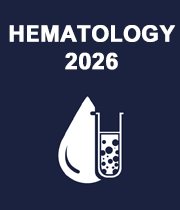Thalassemia
Thalassemia is a hereditary (i.e., passed down through the generations) blood illness characterised by the body's inability to produce enough haemoglobin, a key component of red blood cells. When the body's red blood cells don't have enough haemoglobin, they don't function effectively and survive for shorter periods of time, resulting in fewer healthy red blood cells flowing through the bloodstream. All of the body's cells receive oxygen from red blood cells. Oxygen is a type of nourishment that cells consume in order to function properly. When there aren't enough healthy red blood cells, oxygen isn't supplied to the rest of the body's cells, which can make a person feel weary, weak, or short of breath. Anemia is the medical term for this ailment. Anemia can be minor or severe in people with thalassemia. Severe anaemia can cause organ damage and even death.



Title : Acute intermittent porphyria: A neurological dilemma obscured by ubiquitous fgastrointestinal presentation
Mayank Anand Singh, Mimer Medical College, India
Title : Comprehensive symptom management and supportive nursing care in a preterm toddler undergoing HSCT for pyruvate kinase deficiency
Tran Thi Dung, Vinmec International Hospital, Vietnam